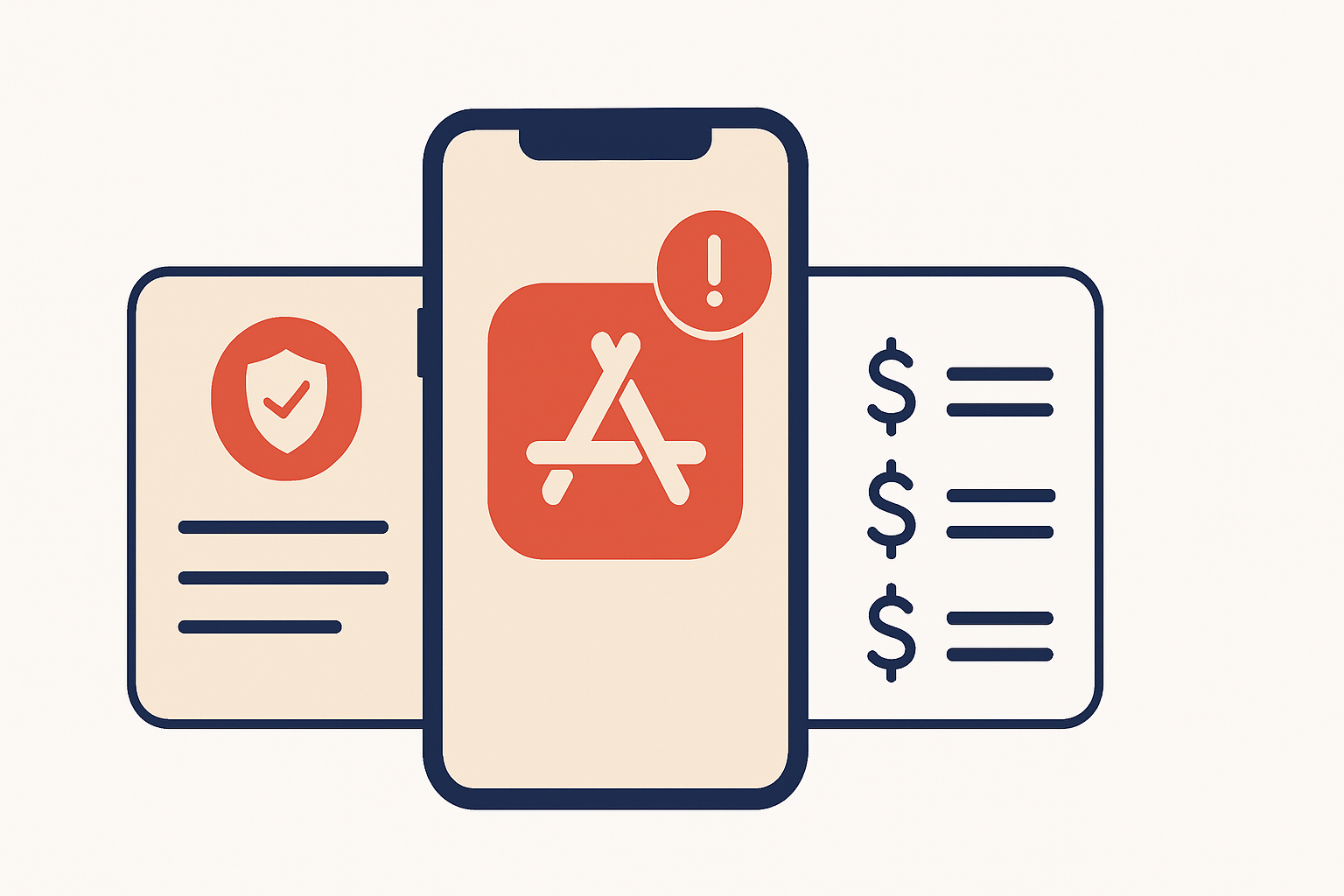App Store Policy Updates & Compliance

For developers and publishers, keeping up with constant app store policy changes is no small task. Both Apple and Google regularly update their guidelines, creating challenges for anyone trying to maintain compliance while building sustainable monetization models. Falling behind can mean delays, rejections, or even app removal. That’s why platforms like Audiorista exist—to remove the compliance guesswork and provide turnkey solutions that keep apps updated and compliant. In this guide, we’ll break down the latest compliance trends, explore Apple and Google’s requirements, highlight risks of non-compliance, and share how to build lasting strategies for monetization while staying ahead of policy changes.
App store policy updates and compliance
App store policies are rulebooks that dictate how apps must handle user data, implement features, and structure monetization. Both Apple’s App Store and Google’s Play Store rely on these evolving policies to safeguard consumers, address new technology trends, and ensure fair practices. Because of rapid changes in the mobile ecosystem—ranging from data privacy regulations to subscription billing practices—policy updates are frequent and often enforceable without much warning.
For developers, this means ongoing vigilance. When platforms announce updates, enforcement usually follows quickly, and non-compliant apps risk penalties that go beyond inconvenience. Missing an update can jeopardize your app’s standing, block monetization channels, or slow down distribution altogether.
Apple app store compliance requirements
Apple’s compliance standards are widely known for being stringent and highly specific. The latest focus areas include:
Data privacy: Apple enforces transparency around how apps collect and use customer data. Developers must provide clear disclosures, implement industry-standard security measures, and support user control of personal information.
Subscriptions: Apple closely regulates in-app subscriptions, emphasizing predictable subscription renewals and transparent billing. Apps must clearly explain pricing, renewal terms, and cancellation processes to users.
In-app purchases: Apple requires apps to use its in-app purchase system for digital goods and services, narrowing alternative transaction paths. For app owners, this reinforces the need to design monetization plans that align with Apple’s strict billing requirements.
For creators and app owners, this environment increases the pressure to build compliance into every release cycle. User trust, app discoverability, and revenue generation all hinge on staying aligned with Apple’s guidelines.
Google play store policy changes
Google Play policies parallel Apple’s but often take a slightly different approach. Recent updates emphasize app security, user data handling, and billing transparency. Google continues to refine compliance expectations around permissions, data storage, and safety disclosures.
Unlike Apple, Google offers more flexibility in certain monetization structures but also enforces robust measures such as detailed privacy policies, upfront user consent, and clear subscription mechanics. Developers can’t afford to ignore these shifts—Google’s enforcement can be just as swift and has implications for both distribution and monetization.
Compared with Apple’s tightly controlled ecosystem, Google Play’s guidelines may appear more adaptable, but they still impose strict accountability. For both large teams and independent developers, the challenge lies in interpreting nuanced updates quickly while continuing to ship products without interruption.
How compliance updates affect developers and creators
Compliance updates extend far beyond technical requirements. For developers, failing to adapt can mean immediate risks such as app removal from the store, delayed launches that stall go-to-market momentum, or lost revenue from blocked monetization methods. Even apps in niche categories, like education or podcasting, aren’t exempt. Educators launching learning apps face additional scrutiny around data handling for students, while podcasters moving to mobile apps must navigate subscription billing rules and content policies.
Ongoing compliance therefore isn’t optional or a one-time task—it’s a continuous responsibility. Developers and creators must treat compliance with the same priority as performance optimization or content updates. Missing just one shift in data privacy or subscription terms can derail months of effort, impact relationships with audiences, and stall revenue streams.
Best practices for app compliance
Staying compliant in such a dynamic landscape requires proactive measures that allow developers and creators to manage risk without slowing down innovation. Best practices include:
Regular monitoring: Always stay up to date on announcements from Apple and Google to identify relevant changes early.
Clear monetization framework: Design your in-app monetization strategy with compliance in mind, avoiding structures that conflict with platform requirements. For creators, this is especially relevant when considering subscriptions, bundled content, or in-app digital products. If you’re focused on launching educational apps, compliance must be embedded into app functionality from day one. Likewise, podcasters considering revenue channels should explore options for monetizing your branded app to balance policy alignment with new income opportunities.
Transparent user data policies: Be explicit about the data you collect, why you collect it, and how it’s used. Both Apple and Google require clear disclosures, and users value transparency as part of trust-building.
By adopting these best practices, you help insulate your app against disruptive enforcement action and make long-term app growth more sustainable.
Why Audiorista helps you stay compliant
Keeping pace with compliance while focusing on content creation can be overwhelming. That’s where Audiorista makes a difference. The platform ensures that creators, educators, and publishers can launch branded apps that remain compliant with both Apple and Google requirements without needing to micromanage every policy change. Audiorista provides plug-and-play compliance support, runs regular updates in the background, and offers flexible monetization frameworks that align with app store rules. By removing the complexity of compliance management, Audiorista gives you the freedom to focus on building your audience, scaling your brand, and monetizing effectively.
Build your branded app with Audiorista today—stay compliant, reach your audience everywhere, and unlock smarter monetization without the policy headaches.


